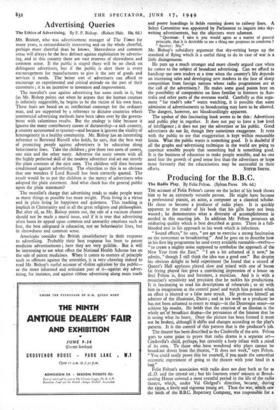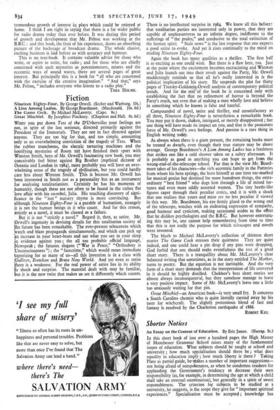Producing for the B.B.C.
The Radio Play. By Felix Felton. - (Sylvan Press. 10s. 6d.) THE account of Felix Felton's career on the jacket of his book shows him to be an extremely versatile person. He might have become a professional pianist, an actor, a composer or . a . classical scholar. He chose to become a Producer of radio plays. It is quickly apparent to the reader of his book that his gifts have not been wasted ; he demonstrates what a diversity of accomplishment is needed in this exacting job. In addition Mr. Felton possesses as endearing quality which is best described as gusto. There is a full- blooded zest in his approach to his work which is infectious.
" Sound effects," he says, " are apt to exercise a strong fascination on the newcomer to broadcasting." . And he goes on to describe how in his first big programme he used every available turntable—twelve- " to create a mighty noise supposed to symbolise the approach of the New Year from the East." " I am a bit ashamed of it now," he admits, " though I still think the idea was a good one:" But despite his obvious delight in bold experiment (he found that a record of Queen's Hall applause„ played slow and mixed with one of bacon fat frying played fist gives a convincing impression of a house oil fire) Felton is, first and foremost, a musician. And it is with it musician's sensitivity and precision that he tackles his productions. It is fascinating to read his descriptions of rehearsals ; to sit with him in imagination at the control panel and watch him pounce when an effect is blurred or a false note struck. He professes. himself an admirer of the illusionist, Dante ; and in his work as a producer he has not been ashamed to resort to magic—in the Dantesque sense—to achieve his results. He holds that the creation of an illusion. is the whole art of broadcast draina—the persuasion of the listener that he is-seeing what he hears.. Once the picture has been formed it must not be-broken, althougt if shifts and changes according to the play's pattern: _It is the control' of this pattern that is the producer's job. The theatre has been crescriberl'as the Cinderella of the arts. Felton goes to some pains to prove that radio drama is a separate art— Cinderella's child, perhaps-- but certainly a lusty infant with a mind of its own. To those who have wondered why plays, cannot broadcast direct from the theatre, " It does not work," says Felton. "You could easily prove this for yourself, if you made the somewhat eccentric experiment of going to the theatre with your head in a bag."
Felix Felton's association with radio does not date back as far as 2L.O. and the crystal set; but his fourteen years' sojourn at Broad- casting House covered a most eventful period in the life of the radio theatre, whi5h, under Val Gielgud's .dhection, became, during the 193os, a lively and vigorous young art. Then the war, which saw the birth, of the B.B.C. Repertory Company, was responsible for a tremendous growth of interest in plays which could be enjoyed at home. I think I am right in saying that there is a far wider public for radio drama today than ever before. It was during this period of growth and development that Mr. Felton was working at the B.B.C.: and this book, the fruit of his experience, draws an absorbing picture of the backstage of broadcast drama. The whole elusive, exciting business is laid before us with accuracy and humour.
This is no text-book. It contains valuable advice for those who write, or aspire to write, for radio ; and for those who are chiefly concerned with such mysteries as potentiometers, mixers and the eccentric ways of sound waves, there are several pages of great interest. But principally this is a book for " all who are concerned with the exercise of the creative imagination." " And that," says Mr. Felton, " includes everyone who listens to a radio play."
THEA HOLME.







































 Previous page
Previous page